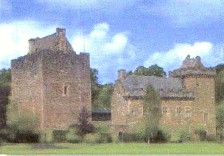The Boyd family, is an ancient family, Gaelic, and of Royal Lineage, first appearing during the 11 century in the Scottish Highlands.
A Robert Boyd was first found noted in Scottish records in 1240 AD. The first chief of the Boyds was Sir Robert Boyd who fought at the Battle of Bannockburn 24 June 1314. For his loyalty & actions, King Robert the Bruce rewarded him with the Barony of Kilmarnock- which became the family seat.
Construction on Kilmarnock Castle begins at this point. The loyalty of this family to the cause of Scottish independence earned them the nickname Confido or "Trusty Boyds".
In 1466 the Boyds of Kilmarnock reached the height of their power when Lord Boyd became the guardian for King James III. In 1469 the Boyds fall from ascendancy.
Eventually the Boyds recovered their lands in the parishes of Darly, Kilbride, and Kilmarnock. Like most Scottish families, the Boyds feuded with their neighbors such as the Montgomeries and the Stewarts of Darnley.
In the 15th and 16th century, several branches of the family produced prominent scholars such as James Boyd, Archbishop of Glasgow and Zachary Boyd who translated the bible into verse. It is during this time some of the Boyds move to Ulster in Ireland.
The last chief of this ancient line of Boyds was William, 4th Earl of Kilmarnock. William participated in the Jacobite rising of 1745 and was beheaded for treason. The
chiefdomship of the Boyd family ceased to exist although several branches lasted into the 19th century.
During this time, several Boyd families were taking prominent role in the development of the American colonies. The Boyds of Mecklenburg County, Virginia, Boston, Massachusetts, York County, Maine, and Georgia. The Ulster-Scot Boyds entered the USA through Pennsylvania and then followed the migration trails heading south and westward.

|  |
 | Kilmarnock Castle
A Boyd Ancestral Castle 
Dean Castle
formerly known as Kilmarnock Castle
Kilmarnock, Scotland
The primary seat of the Boyds for over 400 years. The castle is located about a mile north of the town Kilmarnock, in the county of Ayre, in western Scotland. It is now open
to the public as "Dean Castle Country Park," belonging to the Kilmarnock and Louden District Council.
The name "Dean" is an old Scottish term for a wooded glen. |
 |  |
|




